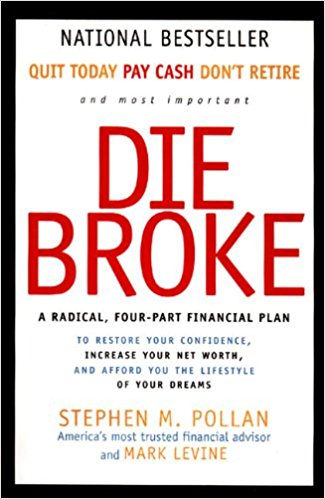
[Quit Today, Pay Cash, Don’t Retire and most important] Die Broke
I’m a sucker for any and all things personal financial related. One of the best feelings for me is a book (any book) that helps me to see the world in a new way. Extra points if the book can help me to make actual changes to my day-to-day decision making and move me in a better direction. Imagine my surprise when I picked up a book that was literally in my roommates’ rubbish bin, and started perusing it and found it pushing against some of my long-held personal financial tenets.
The book in question is called “Quit today, Pay Cash, Don’t Retire and most important DIE BROKE”. This is obviously a provocative title which led to me reaching past the other random titles and picking it up from among the clutter. It was published in 1997 by HarperBusiness, division of Harper Collins. The fact that this book is 10 years old surprised me because the topics in the book seem to be right in line with the current financial environment that we find ourselves in.
An Example:
“But in a time when there’s no such thing as corporate loyalty, when anyone can be laid off for any reason, with no regard to their performance, when kids graduating from Ivy League colleges are taking positions as temps, when raises are as rare as Chicago Cubs pennants, viewing yourself and your job as one is a tremendous financial and emotional risk.”
This book really hit me between the eyes with a couple realizations. The first was how fear-based some of my behaviors were related to money. Growing up the first son of Nigerian immigrant parents was a crash course in self-denial. My parents did not have a lot of money for most of my childhood. In my early childhood we lived in neighborhoods where nobody had a lot of money. By the time things started getting better, unfortunately my mental model for life was set. “No” was the most common refrain when requests for things that cost money was raised. I was terrified of the poor people I would see on the street, my young (and probably more correct than I knew) mind believing that there were only a couple mistakes separating me from them. I thought one mistake could land me on memorial drive, outside the Walgreens asking for change. As a result of this fear, I became a professional at self-denial. I specialized in saving every dollar and buying ramen noodles. This came in handy during school and residency but is probably mal-adaptive during my post-school years. One of my favorite passages comes near the beginning of the book:
“Die broke…At first it sounds insane. Instinctively it’s something to avoid at all costs, not something to pursue with a vengeance. It immediately conjures up images of Dickensian poverty; of Depression-era families having their mortgages foreclosed on by Lionel Barrymore. But fight off those instinctive responses and reflex images and think about for a minute…The images of financial ruin that instantly spring to your mind are from the turn of the prior century. That’s because your entire approach to money and career, and much of your approach to life, is based on principles and beliefs that sprung from the experiences of the past. Your fear of dying broke is an early twentieth-century fear carried forward to a twenty-first-century life.”
I’d upgraded all the other rules that I lived by – my guidelines for treating hypertension and dyslipidemia have changed dramatically since the time I was in school. I think it makes sense that my mental financial frameworks do the same. The author puts forward a new paradigm for thinking about money and planning our financial lives.

His recommendations are put forward in four simple maxims:
- Quit Today
- Pay cash
- Don’t retire
- Die broke
These form the basis for his new rules for living in the new world.
Quit Today:
“When you were growing up you were always told that if you got a good education you’d get a good job; if you did what was asked of you in that job you’d be secure; and if you did your job well you’d get raises and promotions. Under such circumstances it became easy for your job to represent yourself; somehow what you did for a living reflected on your value as a human being and the values you held… But in the new world..The answer is to quit today: mentally separate yourself from your employer and realize that you’re on your own”
I think this advice is unfortunately, spot on. The working world and the promises that our parents could depend on have unfortunately gone the way of the dodo bird. Oftentimes as white collar professionals, we as pharmacists can be lulled into thinking that our jobs are safer than blue-collar jobs. While I do agree that we do have more legislative moats, etc around our profession; did you know that pharmacist jobs are 47% autonomous, or almost half likely to be automated? I think we must all stay sober about living according to the rules of the new workplace.
Pay Cash:
This admonition is pretty straightforward and was remarkably before its time. Now we’ve all heard the teachings of Clark Howard and Dave Ramsey enough to understand the psychological benefits in reducing spending by having to fork over cold hard cash.
Don’t Retire:
This advice was definitely before it’s time in 1997 and still on the vanguard of work-life thought now. Per the author:
“Retirement made a lot of sense at a time when you weren’t going to live much longer than age sixty-five, when your job was backbreaking, when you got less productive as you got older, and when society had to make room in the job market for lots of young people…But in this new age, retirement is not only not worth striving for, it’s impossible for most – and something you should do your best to avoid. The notions it’s based on are simply no longer true.”
This is one of the thoughts that most resonated with me. For a good while, I’ve flirted with the notion of early retirement. I plan to write more about that alternative for pharmacists but I found that for my life situation that approach didn’t account for the risk of early death, ill health, familial responsibilities, and other things that can vary on a individual basis. By releasing my need to financially forecast for an arbitrary end date of sixty-five I found myself free to contemplate the many different career and life options available to me.
Die Broke:
This is by far the most controversial and perhaps paradigm shifting of the maxims. The author strongly argues against saving to give your children an inheritance or expecting one from your parents. He argues that it’s not financially, spiritually, or personally beneficially to either the giver or the receiver. Some points he raises that I found resonated are:
- “Creating and maintaining an estate does nothing but damage the person doing the hoarding. It will force you to put the quality of your death before the quality of your life. You’ll be forced to choose not to spend on something for yourself so your kids can use the money.”
- “Inheritance also hurts society. Funds maintained in an estate are generally kept in frozen investments that contribute very little to the productivity of the economy”
- “Estates and potential inheritances can also hurt families. By inserting economic self-interest into emotional decisions, they can damage family dynamics and relationships. Suddenly, your son views your purchase of a new sailboat not as your lifelong dream being fulfilled but as money coming out of his own pocket..And what do you think it would do to your soul to have a reason to look forward to the death of a loved one?”
- “You can help your children when they’re young and need it most. Rather than leaving them money when you die, you can send them to Europe for the summer, help them buy a car, supply the down payment for their first home, or provide start-up capital for their own business. Given wisely, such lifelong gifts can have a far greater long-term impact on their lives.”
Being the first son of immigrant parents I can appreciate that knowing there was no safety net for me forced me to really strive to create my own way financially. I wonder if I would have been as driven if I knew that I could just wait on my parents to bail me out of bad financial decisions.
The first half of the book delves into the thinking behind these maxims while the second half of the book talks through specific applications of these maxims in different realms. These specific applications tend to be pretty dated and not quite as helpful. The real benefit of this book is found in the first half of the book.
I would definitely recommend this book for anyone who is looking for a still-fresh financial viewpoint on their long-term financial outlook.

It’s always a relief when someone with obvious expsitree answers. Thanks!